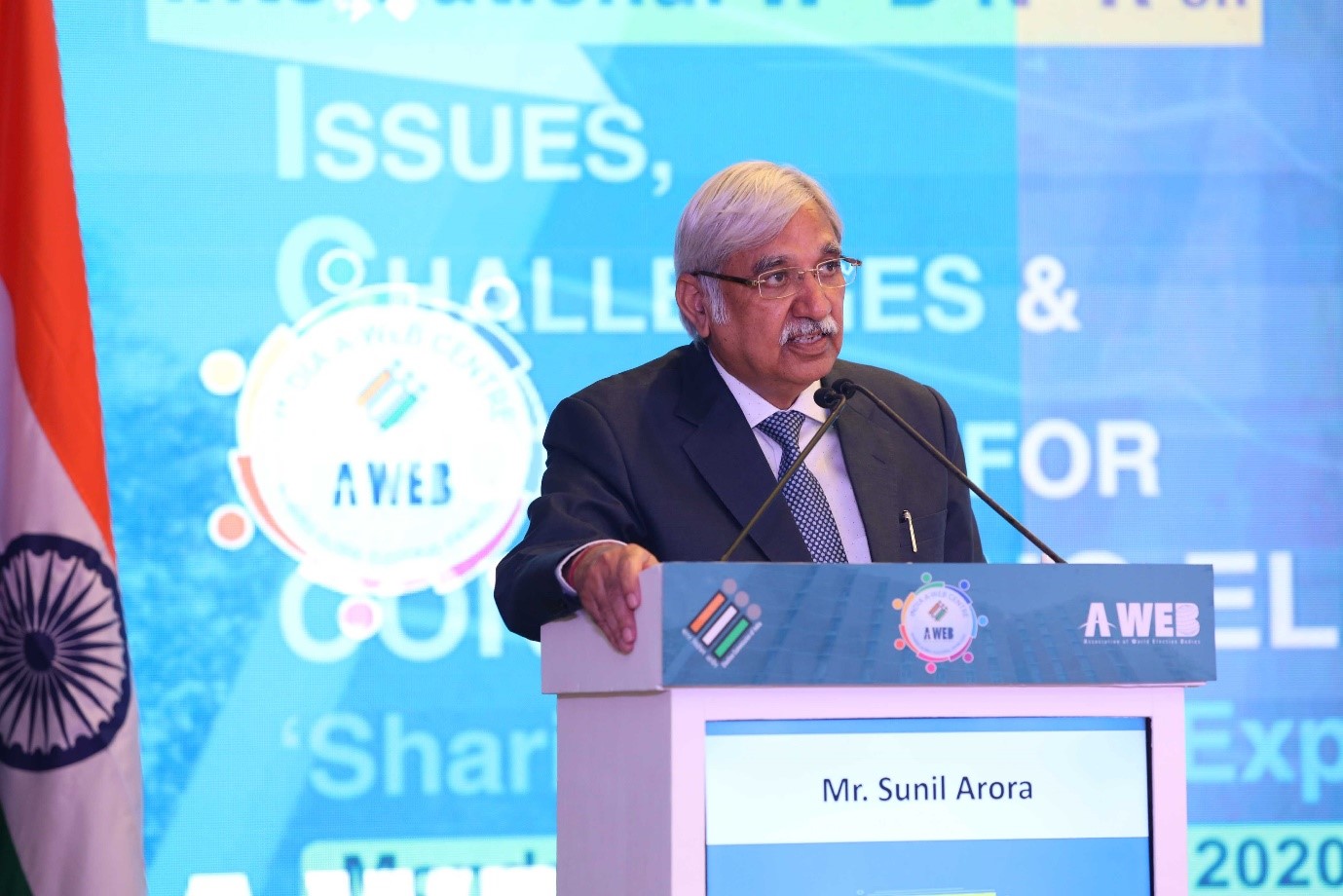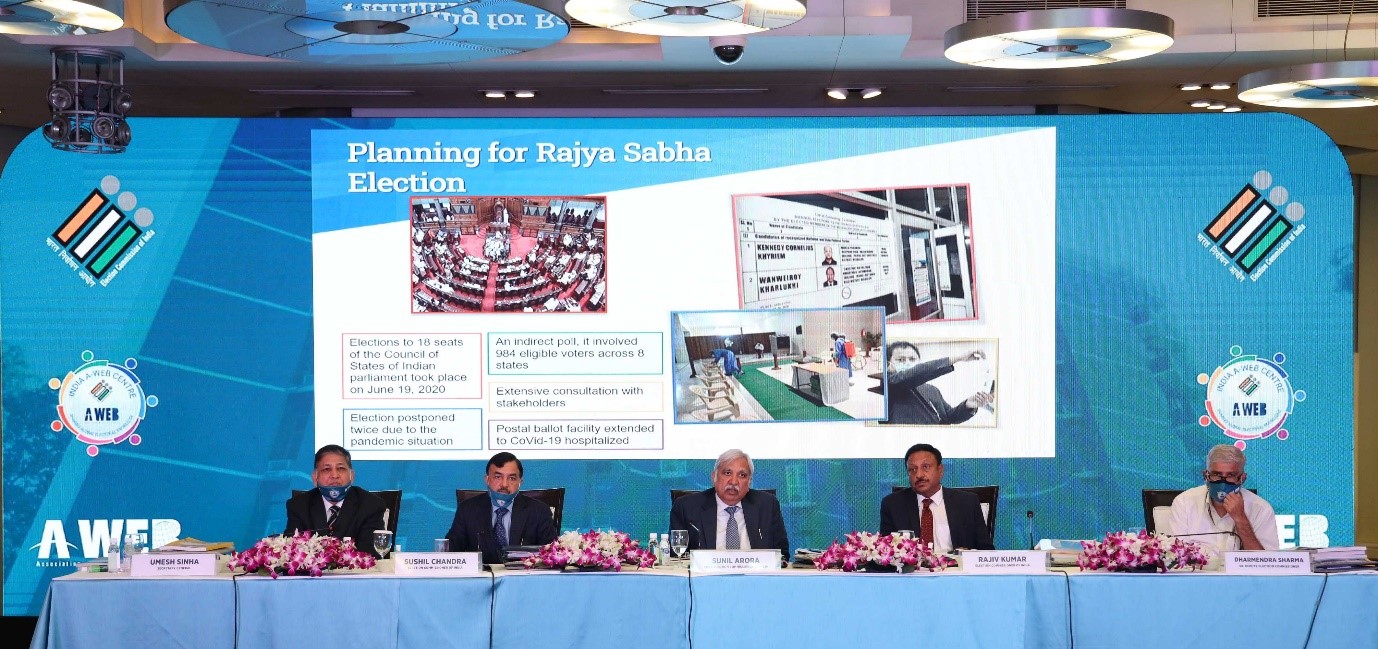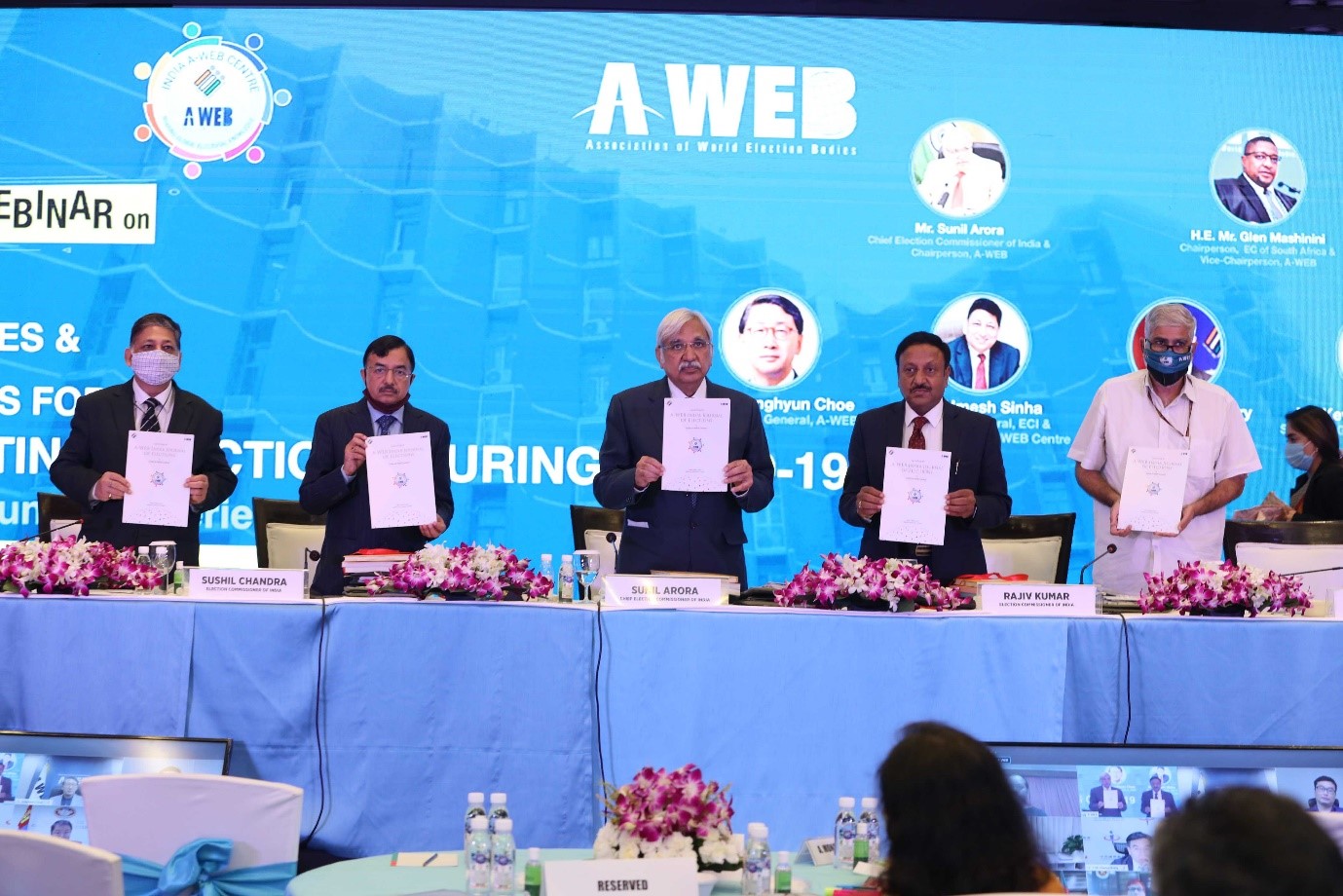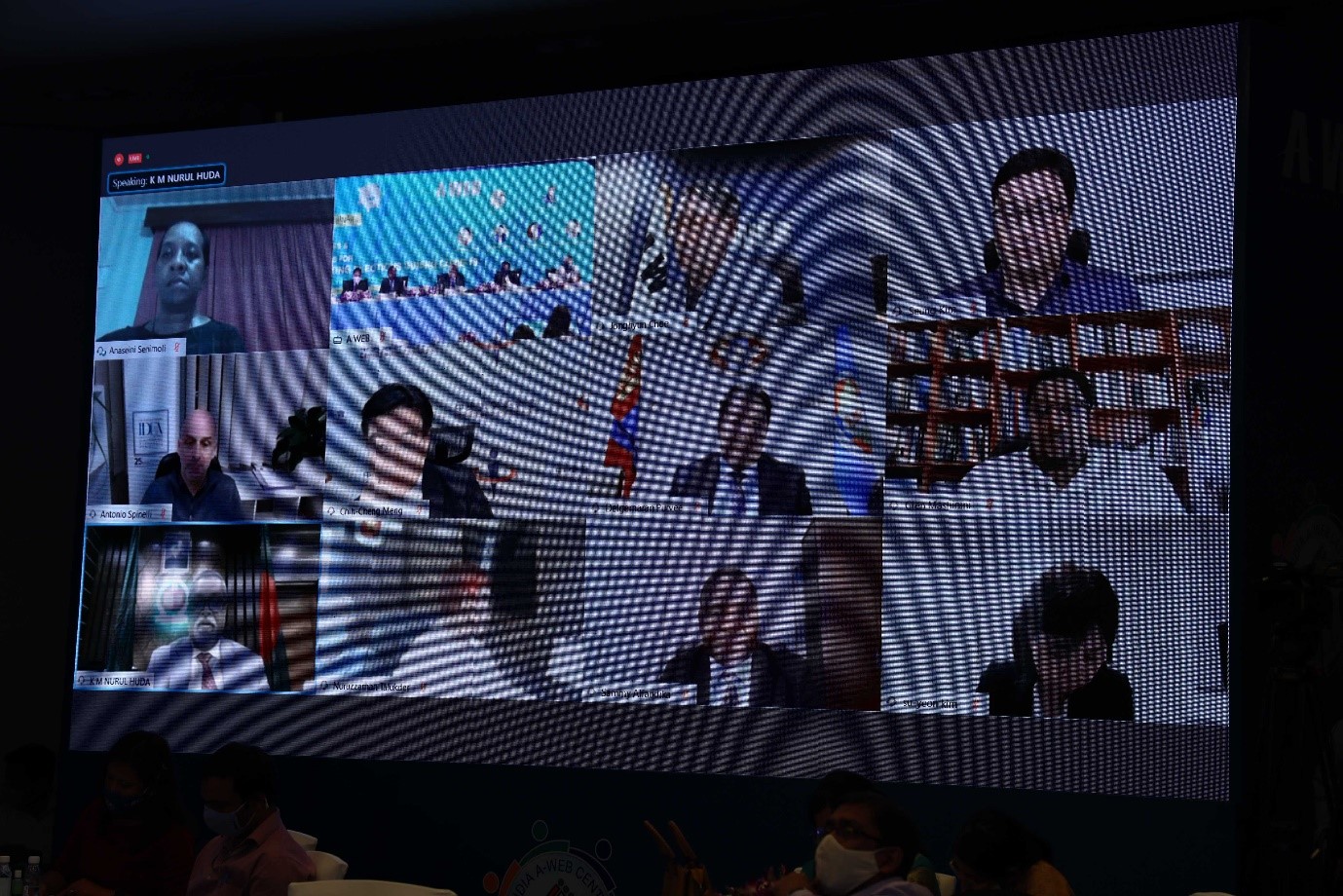
Global Knowledge Network On Voter Education - learning from each other
On completion of one year of Chairmanship of the Association of World Election Bodies (A-WEB), the Election Commission of India) hosted an International Webinar on, ‘‘Issues, Challenges and Protocols for Conducting Elections during COVID-19: Sharing Country Experiences’ through its India A-WEB Centre. It was an occasion for democracies across the world to come together to share experiences of conducting elections during COVID-19. Last year on September 3, 2019 India had taken over as Chair of A-WEB for 2019-2021 term during the 4th General Assembly of A-WEB held at Bengaluru. Inaugurating the Webinar, Chief Election Commissioner of India and Chairperson, A-WEB Sunil Arora spoke of the “tough predicament” faced by Election Management Bodies across the world - whether and how to hold scheduled elections in a state of public health emergency.
 On this occasion, India A-WEB Centre released publications namely, ‘A Ready Reckoner: Brief Profiles of Countries, Election Management Bodies and Partner Organizations of A-WEB’,‘ International Experiences of Conducting Elections During COVID-19’ besides release of the ‘Brochure’ for launch of ‘A-WEB India Journal of Elections’. “The contextual framework of every country was different, the extent and trajectory of the disease varied and so was the capacity of each country to respond to the novel corona virus and its catastrophic impact. Countries such as South Korea, Australia, Malawi, Taiwan, Mongolia and many others who went ahead with scheduled elections even as they put in place the enormous arrangements, required to ensure the health and safety of people while conducting election,” he said.
On this occasion, India A-WEB Centre released publications namely, ‘A Ready Reckoner: Brief Profiles of Countries, Election Management Bodies and Partner Organizations of A-WEB’,‘ International Experiences of Conducting Elections During COVID-19’ besides release of the ‘Brochure’ for launch of ‘A-WEB India Journal of Elections’. “The contextual framework of every country was different, the extent and trajectory of the disease varied and so was the capacity of each country to respond to the novel corona virus and its catastrophic impact. Countries such as South Korea, Australia, Malawi, Taiwan, Mongolia and many others who went ahead with scheduled elections even as they put in place the enormous arrangements, required to ensure the health and safety of people while conducting election,” he said.
Elections in India pose formidable challenges on account of large electorate, geographical and linguistic diversity and differing climatic conditions. Elaborating on the scale of the upcoming elections to the Legislative Assembly of Bihar, Arora mentioned that the total number of electors is 72.9 million. Further, explaining the impact of COVID-19 on the election, he highlighted how Corona virus disease exigencies and social distancing measures necessitated a revisit of ECI’s extant instructions. The maximum number of electors at a polling station has been reduced from 1500 to 1000so consequently, the number of polling stations have shot up by 40 per cent, from 65,000 to over 100,000. The changes would have huge logistics and manpower implications.
The Chief Election Commissioner also mentioned that ECI has placed a lot of emphasis on extending facilitation to senior citizens, women, persons with disabilities and in current circumstances, ensuring franchise to COVID-19 positive voters and those in quarantine. In this context, the CEC mentioned how, beginning with the elections to the Legislative Assembly of Jharkhand in November-December 2019 and elections to the Legislative Assembly of Delhi in February 2020, the postal ballot facility was extended to voters who are aged more than 80 years, persons with disability and those who engaged in specified essential services. This facility of postal ballot has also been extended to COVID-19 positive electors who are in quarantine/ hospitalized.
He added the specific and detailed guidelines that have been drawn up on conducting election during the time of COVID-19. He also mentioned the successful conduct of elections to 18 seats of the Rajya Sabha in the month of June, 2020. Further elections are due in the states of West Bengal, Assam, Kerala, Puducherry and Tamil Naduin the first half of the year, 2021.
Mentioning the two publications being released on the occasion viz. ‘Brief Profiles of the Countries, Member EMBs and Partner Organisations of A-WEB’ and ‘International Experiences of Conducting Elections during COVID-19’, he said these would be a useful tool for researchers and practitioners alike. He said that A-WEB India Centre has also progressed considerably towards publishing a world class journal called ‘A-WEB India Journal of Elections’. The first issue of this journal will be released in March 2021.He hoped that A-WEB India emerges as the ‘nerve centre’ for intellectual and other activities and requested all other members to contribute and participate.
Session 1:
The session started with opening remarks by K M Nurul Huda, CEC, Bangladesh who focused on ‘fightback’ by the EMB’s with whatever resources.“The Webinar is an effort in imparting success stories of courage and determinations of EMBs who have not compromised elections with the threat of COVID-19 pandemic. It would also provide an opportunity to know which EMBs have taken what precautions under what circumstances. It would benefit all EMBs under the banner of A-Web to share as to how they have encountered corona while undertaking health protective measures while managing elections,” said Huda. Sushil Chandra, Election Commissioner, India shared with the audience the special measures being taken by ECI to ensure conduct of elections under COVID- 19 challenge. He emphasized on the need for coordination with all stakeholders including political parties, effective communication with voters to convince & ensure that the ‘Polling Booths are safe’ & the need for comprehensive new protocols, to be designed to synchronize with Health Guidelines.
A Senimoli, Director Operations, Fiji Elections Office, spoke on advance planning for General Elections 2022 with COVID Safety protocols. Seung Ryeol Kim Advisor, A-WEB Secretariat, spoke on massive efforts made by A-WEB Secretariat to conduct elections during COVID-19 through a series of interactions by way of webinars etc. Antonio Spinelli Senior Advisor, International IDEA spoke on special voting arrangements and managing elections during the pandemic.
On the occasion, he spoke of the ‘theoretical, analytical’ framework by which all of us could situate our individual efforts in comparison to worldwide practices. He categorized the ongoing efforts of EMBs into three parallel dimensions for the COVID-19threat i.e. Physical, Spatial and Temporal. Kin Su-yeon, Professor, KCEID Election Commission of Republic of Korea spoke on,“Election Management in Response to COVID-19” and the 21st National Assembly Elections in the Republic of Korea. Dr Chih-Cheng Meng, Commissioner, CEC Taiwan spoke of Taiwan’s successful experiences in conducting elections during COVID-19 pandemic.
 P Delgernaran, Chairperson, GEC Mongolia spoke on conduct of Parliamentary Elections in Mongolia with well-defined safety protocols. Experience sharing by each of the speakers along with the presentation, walked through the Mongolian experience of conducting the Parliamentary election in June, 2020 within the mandate of ‘Regulation’ on Corona May 2020. It acknowledged, its prior study of global experiences including Korea’s. The measures taken, ensured a 73.6% voter turnout with no adverse health impact reported.
P Delgernaran, Chairperson, GEC Mongolia spoke on conduct of Parliamentary Elections in Mongolia with well-defined safety protocols. Experience sharing by each of the speakers along with the presentation, walked through the Mongolian experience of conducting the Parliamentary election in June, 2020 within the mandate of ‘Regulation’ on Corona May 2020. It acknowledged, its prior study of global experiences including Korea’s. The measures taken, ensured a 73.6% voter turnout with no adverse health impact reported.
Session 2:
In his opening remarks Rajiv Kumar, EC, quoting Mahatma Gandhi, characterized the challenge as to ensure that the underprivileged have the same opportunity as the strong. He suggested an additional test, “Focus on polling percentage with respect to the vulnerable sections”. Containment measures by governments have and are having “constitutional and technology implications on timing and conduct of elections,”he said.
He further briefed the delegates on the Rajya Sabha elections conducted by ECI in June 2020. Mentioning the forthcoming elections of Bihar, he highlighted the framework of SOPs – steps/ guidelines being worked upon by India and placed them in the context of other shared experiences. In context of high expectations of services by EMBs, the “Shared experience” was crucial – and offered to share further experience of India, post Bihar elections. Glen Machinini, Chairperson of the electoral commission of South Africa and Vice Chairperson of A-WEB shared his experience on the impact of covid-19 on democracy and Electoral Cycle. Speaking of ‘Reflections on the South African experience on Elections during COVID-19’, he said that the short term impacts relate to postponement of elections but the defining characteristic of democracy, is the holding of regular elections. In South Africa, the Electoral Commission took the decision in March this year to approach the Electoral Court to suspend all scheduled by-elections. The application to court was granted and continues currently. The reasoning behind the postponement in South Africa was twofold:Firstly to ensure the safety of voters, election staff, candidates and observers, secondly, the imposition of strict government regulations restricting the movement and gathering of people, had a direct and negative effect on the ability for all parties and candidates to campaign freely and effectively. The Commission’s view was that under such conditions, elections could not be free, fair and credible. To date, 72 by-elections have been postponed since March.
Nuruzzaman Talukdar, DG EC Bangladesh informed of the by elections already conducted & the preparation for the 2023 Parliament Elections. He spoke of BEC’s resolve to deal with COVID-19, within its extant legal regime which excluded proxy voting/ online voting and telephone voting. The key point he shared would be,- strategic gradation of election for prioritization. However the key challenge would be- ‘difficult to predict what proper measure would be applicable for an unpredictable problem,”– so empower official to respond appropriately, he said.
That BEC is working on the presumption that it would not be “normal” soon/ or in near future & redirected its commitment to ensuring the ‘election cycle’ – a cycle which is the lifeline of people’s representation, guarantee, accountability & transparency. BEC would be fully exploiting the advantages of data based voting list & online instant voter system to deal with COVID-19 challenges, he emphasised.
Mona A Srinivas Director, IC, ECI made a presentation and shared the sheer numerical (both COVID infections and voters involved), geographical complexity in the Indian scenario, on-going challenge of conducting elections under COVID-19 circumstances. She briefed the delegates on the RS elections conducted on June 19, strategies invoked and the journey of ECI from an initial deferment in March, 2020 upto its conduct in June, 2020.
 The value of decentralized response - probably relevant for big jurisdictions and its balance with a centralized framework was a key take away of the prevention. It familiarized the Webinar with the steps in process for the Bihar elections and use of technology and innovative procedures to deal with the challenge of ‘numbers’ – in particular the extension of postal ballot facility. The presentation ended with one of the ECI’s focused outcomes i.e. ‘No Voter to be Left Behind’. Sammy Alfandka, CEO, Malawi made a presentation as to how, through the court mandated elections of June 2020, Commission had a twin challenge of meeting not only COVID-19 special circumstances but the Supreme Court mandate as well. He made a presentation on “Conducting Elections in a Scenario of Increasing Infections”. The presentation highlighted the role of international cooperation and support to Malawi for equipment & resources. He highlighted a major challenge to balance the competition between ‘financial and human resources.” The success of the effort was a 64.81% turnout, though lesser than the previous one, but nonetheless an “undisputed” election.
The value of decentralized response - probably relevant for big jurisdictions and its balance with a centralized framework was a key take away of the prevention. It familiarized the Webinar with the steps in process for the Bihar elections and use of technology and innovative procedures to deal with the challenge of ‘numbers’ – in particular the extension of postal ballot facility. The presentation ended with one of the ECI’s focused outcomes i.e. ‘No Voter to be Left Behind’. Sammy Alfandka, CEO, Malawi made a presentation as to how, through the court mandated elections of June 2020, Commission had a twin challenge of meeting not only COVID-19 special circumstances but the Supreme Court mandate as well. He made a presentation on “Conducting Elections in a Scenario of Increasing Infections”. The presentation highlighted the role of international cooperation and support to Malawi for equipment & resources. He highlighted a major challenge to balance the competition between ‘financial and human resources.” The success of the effort was a 64.81% turnout, though lesser than the previous one, but nonetheless an “undisputed” election.
Closing Session:
Dharmendra Sharma, DG IIIDEM summarized the presentation for the audience. Kevin Casas-Zamora, International Institute for Democracy and Electoral Assistance (Intl. IDEA) referring to the trends and figures he said that at the beginning of the pandemic, in March and April, the electoral calendar was dominated by postponed elections, many uncertainties and questions such as: Can elections be held safely for voters and without leading to further spreading of the virus? Will incumbents abuse the difficulty of holding elections to extend their mandates? Will the increasing number of postponed elections lead to longer term legitimacy deficits? How long will it take to recover from this deficit? If elections can be held, will they be credible? Will turnout suffer? He said that International IDEA has been very closely monitoring the global developments pertaining to all facets.
“The first lesson is the importance of political consensus in sustaining decisions made on the electoral calendar and procedures. The second lesson has to do with Special Voting Arrangements and the need to enable various modalities to cast the vote. The third lesson concerns the enormous impact of communication by the electoral authority. In the Korean case, once again, the authorities made a splendid effort to communicate not only the availability of expanded voting mechanisms, but also the strict sanitary protocols that would be applied to minimize the possibility of contagion in the voting centres,” said Mr Zamora.
The latter contributed to creating the perception that voters were not confronted with the harrowing decision between exercising their most basic civic right and protecting their health. The fourth point: resources.
“The pandemic forces us to adopt measures that reduce the risks of contagion, which range from the availability of masks and other protective materials, to the opening of more voting centres and the extension of voting period. If you want proper elections, you have to be willing to give more financial and human resources to the electoral authorities,” he said.
Fifth, crucial factor: Like so many other things, successful elections ultimately depend on controlling the pandemic. Holding elections under quarantine conditions is inherently impossible. Mr. Anthony Banbury President & CEO, International Foundation of Electoral Systems (IFES) mentioned that democracies depend upon public assembly, transparency, confidence, legitimacy in elections and government institutions—all of which are put at risk by the COVID-19 Pandemic.
“I believe that every challenge carries with it the potential for positive breakthroughs – and the COVID-19 crisis has generated critical new opportunities to strengthen democratic institutions and electoral processes. Election management bodies, together with partner institutions and organizations like International IDEA, A-Web and IFES, are re-thinking election fundamentals in ways that could reap longterm benefits for democratic inclusion,” said Banbury.
 Secretary General, Association of World Election Bodies (A-WEB) Jonghyun Choe, expressed his appreciation to the Election Commission of India for the invitation to attend this meaningful seminar. He said that this seminar was quite symbolic, for India is the largest electoral democracy in the world. He also congratulated the India A-WEB Centre on excellent achievements since its establishment in September last year.
Secretary General, Association of World Election Bodies (A-WEB) Jonghyun Choe, expressed his appreciation to the Election Commission of India for the invitation to attend this meaningful seminar. He said that this seminar was quite symbolic, for India is the largest electoral democracy in the world. He also congratulated the India A-WEB Centre on excellent achievements since its establishment in September last year.
He said that the entire world has been suffering as a result of this pandemic. And this unprecedented crisis has greatly impacted the field of election as well. As the Secretary General of the Association of World Election Bodies, he said he has gained a sense of the challenges faced by election management bodies all over the world. Over 120 delegates from 45 countries across the world, international organizations (viz. International IDEA, International Foundation of Electoral Systems (IFES), Association of World Election Bodies (A-WEB) and European Centre for Elections) participated in the Webinar. The Association of World Election Bodies (A-WEB) is the largest association of Election Management Bodies (EMBs) worldwide. At present A-WEB has 115 EMBs as Members & 16 Regional Associations/Organisations as Associate Members. ECI has been very closely associated with the process of formation of A-WEB since 2011-12. The webinar concluded with a vote of thanks.
Contributor:
Neha, Soniya & Heineken Saumpi Executives, India A-WEB Centre